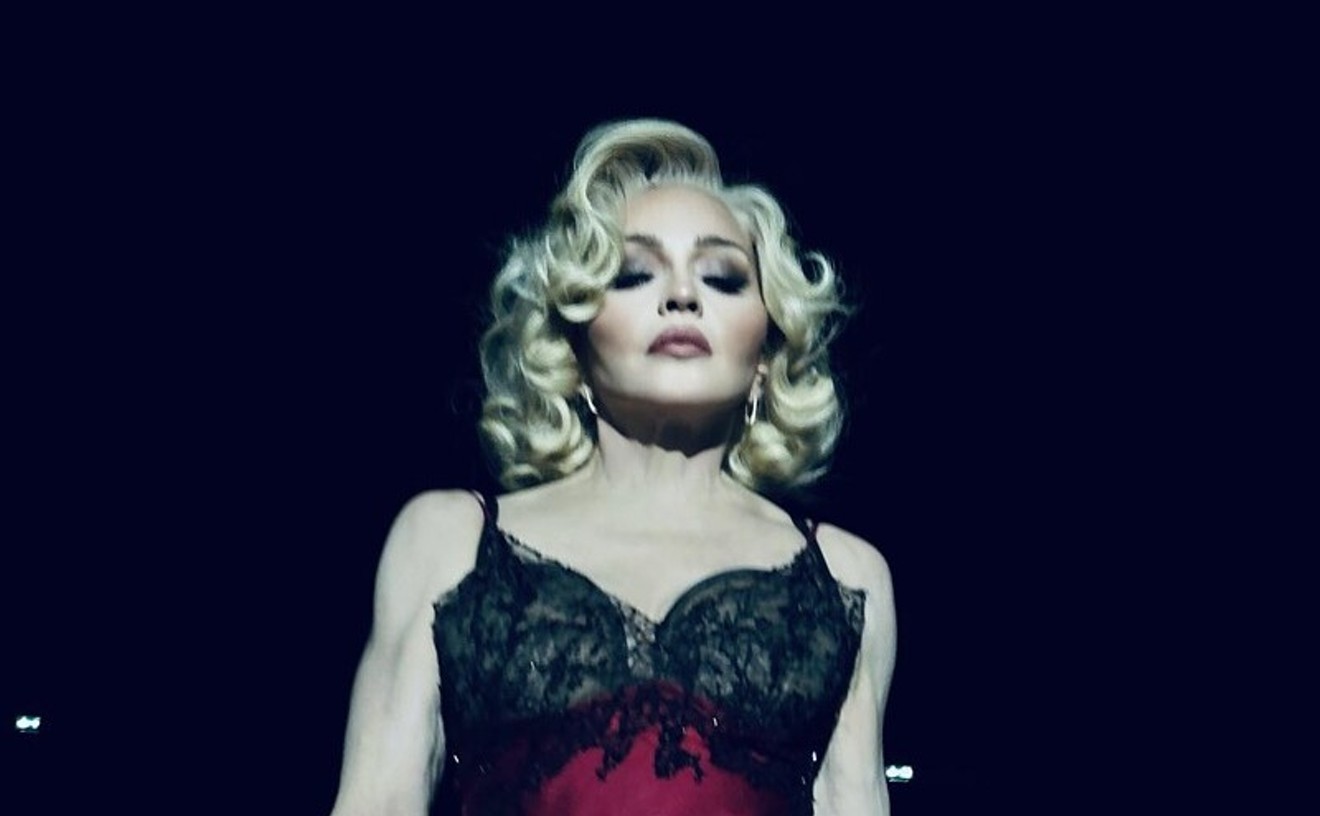Peter Murphy co-founded the influential post-punk band Bauhaus in 1978 with Daniel Ash, David J and Kevin Haskins. Over the course of four full-length albums, Murphy and company creating an experience of heightened reality with its music that broke from convention, not just sonically but with lyrics informed by the avant-garde, romantic literature and '70s glam rock. It was a richly imaginative counterpoint to the world of expectation in industrial England of the decade when punk rock helped to pierce the veil of post-war British mundanity and economic and cultural stagnation.
See also: - Tuesday: Peter Murphy at Summit Music Hall, 7/16/13 - Bauhaus guitarist Daniel Ash on the zen-like appeal of motorcycle riding - Review: Peter Murphy at Bluebird, 11/28/11
When Bauhaus broke up in 1983, Murphy embarked on a successful solo career that proved influential in its own right with albums like the haunting yet melodious 1988 offering Love Hysteria, which was followed by the even more experimental but somehow more accessible 1989 album Deep. Murphy has always pushed his own envelope, though, and his 2011 album, the appropriately titled Ninth, proved a step forward in his development as a songwriter.
This year, Murphy is touring for the 35th anniversary of the founding of Bauhaus, and he's playing material from that band's catalog with musicians not from the original lineup but fully capable of delivering the iconic sounds, nonetheless.
We recently spoke with the charming, thoughtful and self-effacingly humorous Murphy about touring without his ex-bandmates, his love of and missed connections with his unofficial music teacher David Bowie and how ancient esoteric thought has informed his work as an artist and human being generally.
Westword: For this tour, you're doing Bauhaus material. Is there a particular album on which you're focusing?
Peter Murphy: I've been touring for years, and the long and the short of it is if you look chronologically, I got Bauhaus together three times. This time it wasn't going to work. That's due to internal reasons, and this is not a tour in spite of anybody.
In 2006, once it was decided by the other members that didn't want to carry on as Bauhaus and all of that stuff, I was free to focus wholly on my own work, which I always do but I would take sabbaticals.
Prior to that I never played Bauhaus music because I felt like it needed to have its own life to keep it integral. If it were ever to be played, we would play it as a band, and if that were to never happen, I wouldn't play it.
As it turns out, after that end, I felt like the flag was in my hand, and I didn't know what to do with it except to integrate a couple of Bauhaus pieces into my own work. And then I started to see that, of course, what's right under your nose is the obvious, and is sometimes missed, is that it's my work, you know?
Not that there was no contention in terms of loyalty to certain individuals, and after all, I'm the voice. I felt like that that was valid. Then I realized that not only is my fanbase loyal and very strong, but my audience is also the Bauhaus audience, but it isn't all of it. So I bring a lot of people into Bauhaus as much as Bauhaus brings people into my work, as it were.
So that all seemed to work, but the other part would be to play it. Because not only is the idea okay in theory, but the practice has to be executed in a way that is very integral, and not like a cover band, or not like me trying to recreate something, but isn't of the kind of integrity and genuine article, as it were.
So I put on one surprise pilot show with one week's notice at a venue in, I think, San Diego. I had two nights where I was going to play Deep in its entirety, and then the next night, I would play Bauhaus only. The first two nights sold out, but the Bauhaus night sold out in about a minute.
Then we had to move it up to a larger venue, which was great, but the acid test was playing the damned thing and it being good. It more than good, and that spawned this tour. I was at the end of my Ninth album touring cycle, and I was ready to go into an album, and expected to take, as anyone would, three or four months in doing it here and there.
So I thought that while I'm doing that, I'll do that tour. I did a few shows in America, and it expanded into a world tour, and it's still going. It's been going absolutely amazingly. I know exactly what it should sound like, and I've directed the band. The band that I've been working with for a long time -- Nick Lucero on drums, Mark [Gemini] Thwaite on guitars and Emilio Zef on the bass and electric violin. I know that they can hack it.
Any musician can play a certain note, but that note has to sound right. I was like, "Oh yeah, stamp of approval. Let's go. This is kickass, this is really something. This is the shit." Excuse my French, but this is the shit.
It was a watershed moment, really, because Bauhaus is alive in me, really. People aren't coming to see Peter Murphy solo, though some are coming for me, but some people are coming with a lot of trepidation like, "Oh, god, I hope he doesn't spoil the myth." But they're coming away after the first two songs with their eyes and faces going, "Oh my god!"
For me, it's a bit of a psychological mind bend, to go back to the album, Lion, far from taking three months I met with Youth, who is, from my moment in time, when we started with Killing Joke and Bauhaus. We headlined shows together in the very early days, and we're mates. Siouxsie was really punk, but me and him, from that same time, became really good friends.
He's done the Verve, of course, and he worked with Paul McCartney, and he's basically responsible for generating the Orb and that electronic generation. But there we were together, and it took four and a half days.
The English have a penchant for not tooting their own horn, basically. But the Americans don't, so I can do it with you. But this album is fucking amazing. We've still got some tuning to do. I've actually put together a montage of film material with a medley of five of the parts of the songs off the album and playing it before the show to give word on it. We'll probably have it out by autumn at the latest, early next year.
I think Bauhaus is something I can revive because there is an audience that specifically wants to see that. That myth of the early '80s and what we did -- it was truly nostalgic, and it still is. I don't know what I'm going to do with that, but I think I could expand it more in some way at some point in time. I think Lion is going to take me where I should be, really, and should have been for years.
Obviously, for this tour, you're not going to play any of your solo stuff?
Actually, as sort of a converse idea, I put in one or two songs of my own. That went very well, and therein lies the rub. This will probably be mostly Bauhaus, but it's involving into my event anyway. I'm claiming my own legacy, but it's not necessarily associated with Daniel [Ash], David [J] and Kevin [Haskins]. It's very kind of heartwarming that audiences are kind of like, "It's good."
For the Bauhaus stuff, did you kind of have the blessing from the other guys?
No, they're keeping as quiet as mouses. I think that they've had so many chances and their heads are down. But we're all still very good friends. We're English. We're very polite and respectful of each other, in actual fact. There's no terrible, girly, adolescent language. They're good people. They're good people even if they're bastards. We're brothers, you know? And you know what that's like.
Yeah, you fight, but you don't hate each other, necessarily.
No. It's okay, they made a definite thing, and it was good. Being together, it was good, but we've all got our own thing going, and mine is very strong. But it brings a lot of personality and a lot of baggage and you realize why it wasn't working. There's a lot of negative stuff going down.
With lyrics, Daniel and I had contentions with that, this, that and the other -- the egos, too. Why am I taking a quarter of my wage to handle your rubbish? I don't need to do that. I love to do it, and I will do it, I did want to do it. But it's all that stuff, and I think it's good to keep a sense of grace and respect and courtesy with each other. If they were to say something, they would say it to me. But they haven't.
I'll give them a tip at the end of it. I'll give them a record or something. A CD. That's me, I'm a bit satirical. I'm a vocalist. I am a handful, you know. A marvelous handful. A treasure trove. But a bloody pain the ass sometimes.
One of your most fascinating songs from the solo catalog is "Socrates The Python" from Love Hysteria.
Oh yeah. That would work with this Bauhaus set, wouldn't it?
It would totally fit.
That's a good idea. Actually, that's a great idea. But in Bauhaus, I have "Hollow Hills," which is a long track. But that would work, actually. If it doesn't make it into this tour, it will make it into the Lion tour.
Great! There's a lyric in there about "Bennett, Gurdjieff, Jesus" and not to mischaracterize the meaning, but those were all mystics of various religious traditions, though Bennett and Jesus were mystics of different eras of Christianity.
Absolutely. They're like archetypes of the spiritual, of the source. There's only one religion. It doesn't mean that it's our religion and that one's not. There's only one. There can only be one source.
Obviously you've embraced Sufism and its expansive spiritual tradition. Had you become interested in that before writing that song, or is that something mostly came along later?
Definitely, definitely [before]. If you look at the first [Bauhaus album with] "Dark Entries" and "In the Flat Field," those are psychological, sort of esoteric expressions for breaking out of the mundane and the form. That came from coming from a light industrial in England that was very working class where you're expected to be a certain way. In the '70s, of course, it was just something that really spawned punk anger or an outward expression. Post-punk they called it when I came along. It was also Ian Curtis and Killing Joke and all that.
If you think about it, there was a psychodramatic, poetic leaning toward looking for the self, looking for meaning. Of course I was brought up terribly religious and musically religious, in the sense that my parents and uncles were Catholic, but they had a very wonderful, sophisticated orientation toward the spiritual aspect, rather than just the formal, dogmatic thing.
When people say, "You're born Catholic; you're prone to that," it wasn't like that. At the age of eight or nine, I loved to listen to these stories and watch the sacred ritual of the mass and the incense and the hymns and the orientation toward the sacred. Even though as a child when you're first introduced to a man who's been slaughtered on a cross -- "Well he's god; he'll help you."
But the stuff was pretty horrific. Even though you don't consciously know, I already knew that couldn't be the case. There couldn't be sacred mysteries in the dogma. If you don't understand something, put it down to some sacred mystery; there's always something to be discovered internally.
Children aren't stupid. When you see people praying to a statue at a spiritual station and project a polytheistic notion to it, that contradicts monotheism. Monotheism means one god. One means one; there's no other. So how could be there be an other. Even to the essence of it you say, how can you exist other than. So it's very interesting and that drew me to that.
They say the master finds you; you don't find the master. So I would say I couldn't choose this. You call it Sufism, or we call it that in the West, but it's the source. It is informed by definitely knowledge and that knowledge is written. But they say you can be in front of it and hear it all but unless you are adept or apt to being open to it, then it may as well be a stone in front of you. It's very subtle.
Bennett, Gurdjieff and Jesus, those people went to the Middle East to find the sacred brotherhood, as it were, so that was the motif for the source -- those who know. Most people are very much in life and have a school, but it's a school that isn't in some mountain. So this found me, basically. My wife found me -- that was unconscious. The intention is met with an answer as it were.
What I found is that while part of me wanted to run away and find a master, get a load of beads and a hat and be sent to some remote place, once I met that master, I was sent back to be who I am. There's no change. There's just a refinement. That's informed my work unconsciously prior to and consciously afterwards. But that was 1980, and "Socrates" was just at the point where after I really came into contact with the samoon, as it were. That was around 1986.
One day that's going to come out somehow, but it comes out in who you are and not what you say, always, if you hold it. You can tell it all with one look, if you like. You can tell it all with one word or one look. You leave tinders in their hearts and leave it to burn them up, in the best possible way.
It's like seeds.
Yeah. But when people say, "Well you're a Muslim." I say, "I'm a Muslim, Jew, Buddhist, I'm a cowboy, I'm a rock star. Yes, everything. Thank you very much. Good night." People want to label you or say, "Are you going to bomb us?" "No I'm not going to bomb you. I'll bomb you with a love pill, and you'll be freaked out. I'll destroy your ego, but that's all."
I wonder if that's a hint as to why the others in Bauhaus couldn't keep up with me. I tell you I'm a handful. I'm wonderful. I think I'm one of the last marvelous eccentrics of the world. I think I'm Frank Sinatra, Elvis all rolled into one and more. It's just exhausting. Good question, though. They say some people have to learn it but some people are born with that taste [for that mystical path].
You're not doing one Bauhaus album in its entirety or anything like that for this tour?
No, but I might actually be able to do that. In the future, that would be a good Bauhaus outing. I could do a residence and do four nights and do a different album each night. Actually I'm designing each set to be its own journey. I'm also playing some stuff Bauhaus never played live.
It's very good because people already know it all. I go to some place like Norway, and there's loads of people, and I stop and say, "Do you know this music? Do you know what I'm doing here?" They say, "Yeah!" I'm never sure. I never am. There's a bit of a stand-up in my show. You wouldn't believe it.
For that Bauhaus Gotham tour...
"Double Dare" it was.
You were doing something where it looked like you were doing make-up, and it was really funny.
That's right. They get it now. I stop the show and say, "Now what? Now what? What do you want? Stop waving. Hang on a minute. Hi, how are you doing? What's your name?" Then I just launch into this thing equal to Robin Williams, who I love. It's also self-effacing and self-satirizing. It's so great to do that. I help people relax, and then I hit them with the music. I open them up, and then I go right inside with the music. Do you know what I mean?
Definitely. There's a label that's been put on you, too: "Godfather of Goth." Is that something you've embraced.
I don't know what that means, really, darling. Goth happened after Bauhaus, didn't it? So if they want me to be their father, I'll be happy to be. I don't mind, if they behave themselves. Trent has really behaved himself. He's a good boy. There are some others where I think, "Stop that stupid monster rock rubbish," thinking that it's all evil and dark and stuff like that. I don't want to mention names. You know? Come on. Stop it. Silly boy.
It always seemed like Bauhaus was more steeped in literature and glam rock.
Exactly, sir. Thank you very much for saying that. I don't want to have to keep saying it. It's exhausting to have to keep saying that. The label is fine. If anybody calls you a legend or a "Godfather," you've got to be on it. I'm very grateful for that. I'm not going to worry about being called the "Godfather of Goth."
In actual fact, Goths are actually much more refined than the average rock and roll blockhead. They really are. They're very interested in literature, and they're not all into monster, dark rock. It's also become a wider genre almost reminiscent of the post-punk thing. I think it's wonderful to be so respected. That's an honor, isn't it?
As long as people don't not come to my show. There are people who come to my show, who are friends, who wear black, and I say, "What are you wearing black for? You've never worn black in your life." I'm on stage and I'm wearing blue. Or there are people that will come and bring their friends because you have to be a certain tribe, but you don't have to be part of a tribe at all and they'll come away and go, "What was that? That was amazing!"
So as long as it doesn't put people off, that would be my only resistance against that kind of labeling. I don't think people know what that means anyway now. I think it's become a cliché. When the press uses it, I don't think they know what they mean. It's much wider now.
I think they should call me the new Bowie. I'm what Bowie should have been. He's put out seventy albums. Not one of my albums is bad. What does that mean? I mean, I love him. He's my teacher. He's Bowie. Come on! But he has done some shit work for ages. We want him to be him. We want him back. I'm sorry. I took over. That last album, the first single, was the smell of Bowie coming back there. Love him to death.
Have you been in contact with him during the course of your career?
Yeah! We worked together on a film called The Hunger back in '83. Later I went to one of his shows. I think he was playing London, and I called back stage, and I didn't know if I could get back stage at all. I didn't know if they'd remember me. This was the first time I used my name and said, "Hello, this is Peter Murphy, can you put me through to backstage?" They said, "Sure!" I went, "Oh my god!"
This was '83, remember. I spoke to Coco, and she said, "Hello, Peter." "Have you got spare tickets?" She said yeah, and my wife and I got back stage. He's the nicest man in the world, such a lovely guy. Of course he's Bowie, and he's complex, but he's British, so he doesn't come out with all of these trips hanging out. You know what I mean? He's very sober, actually.
When I was in New York in 2005, I said, "Fuck this, I'm not going to leave this life without meeting him." No agendas, just say, "Thank you." A big thank you for what he did for me when I was a kid. I called his management company, again, offhand. I said, "Hello, this is Peter." They said, "Hello, Peter. Is this Peter Murphy from Bauhaus?" I said, "No, this is Peter Murphy from Peter Murphy," and she laughed. She said, "Oh, I'm sorry." "Don't worry; you're fine darling."
I told her, I knew Bowie was in the Catskills, which is where I was staying, and that if he was around, I have no agenda -- I don't want to pitch him anything -- I just want to meet him to express my respect. She said, "Oh, that's lovely. I'll tell him. Can I take your number?" I thought, "What have I done here?" The bloody phone rings, and I almost faint. I'm like a big girl still. I say, "Hello," and I forget her name, but she's part of management, and she said David had my number, and he would call back.
So I was working in the Catskills and staying with a friend. I had to come back home to Tokyo, and I was on IM with my friends, and he wrote one word, "David Bowie." I said, "So what?" My friend Sarah said, "Oh god. David Bowie just called me." "What are you talking about? Stop being silly." He thought she was my daughter, "Is your daddy there?" type of vibe. They weren't joking. I changed my numbers when I moved out of there, and I don't think he's called again. That's the last bit that I heard.
I did hear something fantastic he said to one of the producers that I know, he said, "That guy, Peter Murphy, can sing better than me, man. He's a real singer." That made me so happy. I still want to meet him and hand him a handful of stardust and say, "There you are. Have it back. I took it off you. You can have it back. You retired him and I've become Ziggy Stardust for three minutes every night, and it's the real deal."
He really deserves that. Great, beautiful guy. Brilliant, brilliant. Even though we can allow him to go off for ten years. That's totally okay with me. Have a rest. I've only heard little bits of his latest album. I'm very wary of going there. I'll go back to listening to Bowie again, but there's a part where the child leaves the parent and has to be alone. It's a very competitive musician thing, but it's love, too, you know?
When I met him during The Hunger, he was really gracious and the poor thing had to deal with me being very respectful and British. He was on set and hanging out, and the rest of the band were hanging out with him and talking to him. I didn't want to do that. I didn't want to do that. I didn't want to be a sycophant. So I just stayed in my room.
David J, he recounts that, "Peter was so overwrought, he couldn't come out." That's rubbish. I was actually respectful. As it turned out, Danny told me he turned around and said, "Where's Peter?" "He's in the dressing room." Knock, knock, knock. I open the door, and there he is come to visit me. "Come in! Come in!" What the fuck am I going to do here? So I had a bottle of brandy, and I said, "Do you want some brandy?" And he said, "No thanks."
I must have looked like a complete schlep, drunk. I'm not at all. But I had a few shots just to numb me. He was lovely, and he made an effort to find out who I was and give me himself. I remember that. That's so important and so lovely. I was looking at him, "Those are the teeth. That's the eye and that's the hair." It was odd.
I realized that the construct I had made of him was my own, which is as creative as anything. He was the impulse of what one creates and aspires to as an artist in another person as their own. That's why I bring those motives into my songs and my lyrics. "Be yourself if you want to be me."
That's one catchphrase in all those types of things. You know, "Be yourself and I'm me and you see yourself in me." That's from a song called "Disappearing." If you're searching, I'll tell you this, if you're looking for the truth, you're in it. You're like a fish swimming in the sea looking for the water, don't look for it. Isn't that a great image?
That is a great image. It also resonates what we were talking about earlier about mysticism and spirituality.
Definitely. There is a definite form of how we can deal with the control of the ego and this, that and another. The practice is really just about shining the heart. So they say that the work we do as devotees, let's say, is just really just shining he heart. The aim is that once it shines, you are the perfect reflection of god, as it were, or the real.
So the effort is important, but it isn't the end. It isn't the aim. This is what is taught by the Sufi masters, basically. They come from the Islamic tradition but it is safe to say that so-called "Sufism" has been ever present because there's only one religion, as it were.
Follow @Westword_Music











